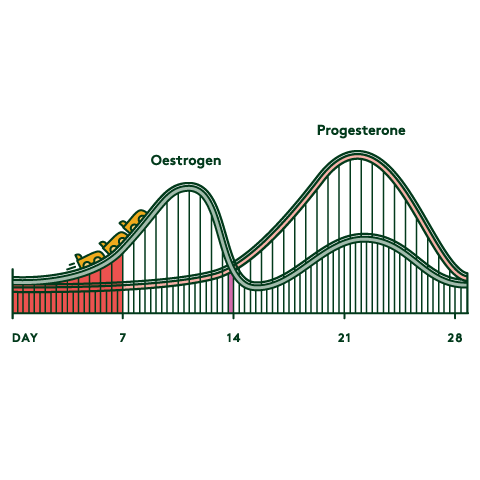The effects of birth control pills on mood can seem baffling. For every one of us who reports that the pill negatively impacted her mental health, there is another who says they feel the same as they does without it, or maybe even better.
Low mood is a listed potential side effect of the pill, meaning enough people have reported it for it to be seen as something worth warning patients about. In fact, mental health side effects of the pill are the most common reason women stop taking it. So if you’re looking for reassurance that it isn’t just you, we’re here to give it to you.
Different pill formulations
There are two different types of hormonal contraceptive pill: the combined pill and the progestogen-only pill (AKA the mini pill). The combined pill contains synthetic versions of the hormones oestrogen and progesterone, while the progestogen-only pill contains (surprise!) just progestogen.
There are many different combined pills, all with varying ratios of oestrogen and progestogen. Different pills also contain different types of progestogen, so each pill has its own unique recipe.
How do the hormones in the birth control pill affect mood?
Progestogen has been repeatedly shown to be linked to low mood. Oestrogen has been linked to mood improvements, and research has shown that combined pills containing very low amounts of oestrogen (low dose pills) are more greatly associated with low mood than those containing higher levels of oestrogen.
That being said, these mood-improving effects don’t necessarily mean that pills with a higher oestrogen content will make you feel better. The hormones in the pill work to dampen your natural oestrogen production, which could also affect your mood.
It’s a bit more complicated than just the types and levels of hormones contained in different pill formulations, though. Every woman reacts differently to oestrogen and progestogen, and some women are more sensitive than others to changes in their hormone levels.
There are also other factors to consider; some women may feel better while on the pill because it can alleviate any anxiety associated with pregnancy prevention, and some women see improvements in the frequency, intensity or duration of their monthly bleeds while on the pill, which can have a positive impact on mood. The flattening effect that the pill has on the body’s natural hormones can also mean that some women find that the mood-related symptoms of their PMS improve.
“
Studies show a link between oral contraceptives and mood changes, like anxiety and depression.
Birth control pills and mood: the research
Studies show a link between oral contraceptives and mood changes, like anxiety and depression. Research has shown that women taking the pill have a dampened positive response to happy stimuli, i.e. the reward centres in their brains don’t light up as much when they are presented with good stuff, like the people they love, compared to those not taking the pill.
One groundbreaking study, which looked at over a million people in Denmark over a thirteen-year period, found that users of both the combined and progestogen-only pill were more likely to be prescribed antidepressants for the first time than non-users. Alarmingly, a study by the same researchers found that current and recent users of hormonal contraception were more likely to attempt suicide.
While this might seem shocking, these effects don’t occur in every pill user. Knowing that these potential side effects exist, and what your individual risks are, can help you to identify any mood issues associated with your contraception as soon as they rear their heads.
Why do some people experience low mood while taking the birth control pill?
Those of us who have underlying mood disorders may be more susceptible to experiencing negative mood effects when taking hormonal contraception. When it comes to the combined pill, women and AFAB individuals who have experienced negative mood effects from the pill in the past are more likely to experience low mood when beginning combined oral contraception again.
Which birth control pill is best for mood?
Progestogen-only contraception is more strongly linked with mood disorders than combined contraception, so if you think you might be at risk of low mood (or know that this is something you have experienced on the pill before) speak to your doctor about trying a combined oral method, and try to avoid low-dose oestrogen pills.
If you are using hormonal contraception solely for pregnancy prevention, there are lots of non-hormonal methods you could try. The copper coil, condoms and diaphragm are all potential solutions, and your healthcare provider should be able to talk you through the options available to you.
Like many gynae health issues, mood-related effects of the pill are historically woefully under researched. Evidence is building, though, and healthcare providers are becoming more able to advise their patients on solutions and alternatives. If you’re experiencing low mood, don’t hesitate to see your GP and remember: you are not alone.


.png?ixlib=gatsbyFP&auto=compress%2Cformat&fit=max&w=1080&h=1080)




